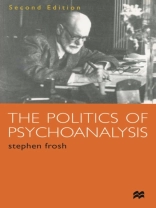Psychoanalysis has had a profound influence on twentieth-century thought in a wide variety of areas, from psychology and psychiatry to sociology, literature, feminism and politics. Most importantly, it offers insights into the relationship between individual subjectivity and social relations, making it a key discipline for understanding the links between social phenomena and personal experience.Since its first publication in 1987, The Politics of Psychoanalysis has been widely recognised as one of the best introductions to psychoanalytic theory from the point of view of its relevance for social relations. As well as describing Freud’s work, it examines the basic assumptions and social implications of a broad spectrum of post-Freudian psychoanalytic thought, especially object relations, Kleinian and Lacanian theory. Feminist and critical psychoanalytic approaches are explored, along with questions of psychoanalytic practice andd its implications for social and personal change.For this second edition, the book has been thoroughly revised, with updated accounts of the theories covered in the first edition, plus new material on contemporary feminist psychoanalytic work and on the engagement of psychoanalysis with postmodernism. The result is a book that combines a lucid introduction to theory with a radical examination of the value of psychoanalysis for therapeutic and social practice.
Stephen Frosh
Politics of Psychoanalysis [PDF ebook]
An Introduction to Freudian and Post-Freudian Theory
Politics of Psychoanalysis [PDF ebook]
An Introduction to Freudian and Post-Freudian Theory
Compre este e-book e ganhe mais 1 GRÁTIS!
Língua Inglês ● Formato PDF ● Páginas 352 ● ISBN 9781349276431 ● Editora Macmillan Education UK ● Publicado 1999 ● Carregável 3 vezes ● Moeda EUR ● ID 6784692 ● Proteção contra cópia Adobe DRM
Requer um leitor de ebook capaz de DRM












